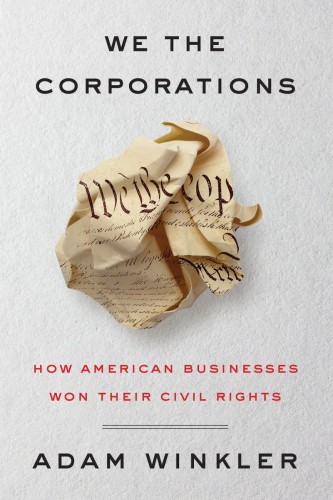
We the Corporations
How American Businesses Won Their Civil Rights
- اطلاعات
- نقد و بررسی
- دیدگاه کاربران
نقد و بررسی

Starred review from November 6, 2017
Journalist and law professor Winkler (Gunfight) evenhandedly traces key interactions between the Supreme Court and U.S. corporations to demonstrate how the controversial Citizens United decision was merely “the most recent manifestation of a long, and long overlooked, corporate rights movement.” Winkler starts his history in colonial America, showing how corporations such as the Virginia Company and Massachusetts Bay Company shaped American life from the very start. The rest of the book focuses on pivotal Supreme Court decisions, from 1809’s Bank of the United States v. Deveaux, over the corporate right to sue, through 2014’s Burwell v. Hobby Lobby Stores, Inc., over religious rights. Winkler’s research is impressively thorough and wide-ranging, including original court records and news coverage as well as other historians’ analyses and interpretations. His argument is well supported throughout. Historical personages, from the well-known (Andrew Jackson, Henry Ford) to the more obscure (Roscoe Conkling, Charles Evan Hughes) to the downright surprising (Cecil B. DeMille), make appearances. He somewhat overstuffs the book with facts and backstory, some of which are only tangential to his project, but all are worthy of attention. Winkler employs an evocative, fast-paced storytelling style, making for an entertaining and enlightening book that will likely complicate the views of partisans on both sides of the issue.

December 1, 2017
A chronicle of the steady, willful process by which corporations became people--until, that is, you try to sue them.As Winkler (Law/UCLA; Gunfight: The Battle Over the Right to Bear Arms in America, 2011) notes, "there was nearly $1 billion in new political spending" in the first campaign cycle after the Citizens United v. FEC decision of 2010, almost all from corporations or wealthy individuals--and that was just at the federal level. It's worth remembering that Citizens United began as an attack on Hillary Clinton, every conservative's favorite bete noire; but, as Winkler notes, it had long antecedents. His account begins nearly 120 years before, in fact, with an argument by Roscoe Conkling, a former senator and friend of President Chester Arthur, before the Supreme Court positing that the authors of the 14th Amendment meant to include corporations when they wrote that no state shall "deprive any person of life, liberty, or property, without due process of law." As Winkler wryly observes, the amendment was meant to protect the rights of newly emancipated enslaved people, not Southern Pacific, and, as he writes, "there was just one small problem with Conkling's account of the drafting of the Fourteenth Amendment: it was not true." Untruths and half-truths abound in the author's subsequent discussion of arguments advanced before--and increasingly accepted by--American courts, including the premise with the recent Hobby Lobby decision that corporations, as voluntary associations of people, can hold religious views. It's small consolation that corporations themselves have not succeeded in gaining the right to vote, but they hold other powers, including, after Citizens United, "the right to use their amassed resources to influence candidate elections." At the same time, thanks to what can only be perceived as a perversion of justice and judicial intent, corporations have none of the responsibilities of people, a textbook example of having your cake and eating it too.Maddening for those who care about matters constitutional and an important document in the ongoing struggle to undo Citizens United.
COPYRIGHT(2017) Kirkus Reviews, ALL RIGHTS RESERVED.

March 15, 2018
Are corporations "persons?" Do they have rights akin to humans? Is this question absurd? If you answered the first two questions in the affirmative, you are correct, at least according to U.S. Supreme Court rulings culminating in the relatively recent (2010)--and highly controversial--Citizens United case. And if you answered yes to the third question, you would not be alone. Prominent legal scholars and jurists, most notably Justice Ruth Bader Ginsburg, in her vehement dissent, take issue with the notion that corporations should be on equal footing with actual people when it comes to the extension of rights. In this fascinating study, UCLA law professor Winkler (Gunfight: The Battle Over the Right To Bear Arms in America) illuminates the evolution of this peculiar idea. Accordingly, he explicates the history of corporations and jurisprudence and explores how capitalism and civil rights have shaped judicial thinking. Moreover, he identifies prominent players, such as Daniel Webster, Roger Taney, Lewis Powell, and Thurgood Marshall. VERDICT Eminently readable and entertaining, this work is highly recommended for fans of Corporations and American Democracy, edited by Naomi R. Lamoreaux and William J. Novak. [See Prepub Alert, 8/21/17.]--Lynne Maxwell, West Virginia Univ. Coll. of Law Lib., Morgantown
Copyright 2018 Library Journal, LLC Used with permission.




دیدگاه کاربران